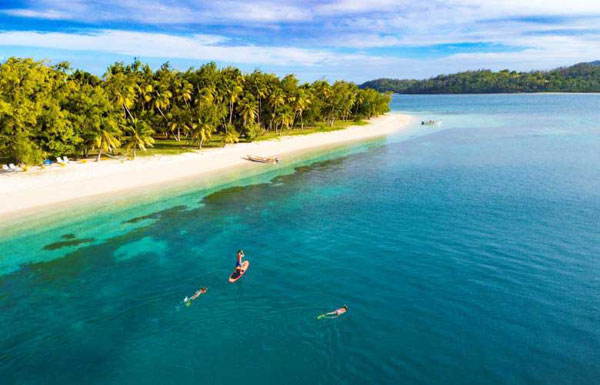Monday, March 20, 2023

At the start of the COVID-19 pandemic, island nations in the Pacific – a region which includes some of the world’s most tourism-dependent economies – shut their borders and banned the arrivals of cruise ships.
These small island states are now reopening, but are increasingly looking to ensure that their rebooted tourism industries are environmentally and socially sustainable.
Rather than chasing as many tourists and tourist dollars as they can, some states in the Pacific – a region famous for its remote, picturesque islands and spectacular marine life – have been looking to limit the number of visitors and the size of tourism projects.
These low-lying nations are not only mindful of the risk of being overrun by tourists that balloon their populations and strain their infrastructure, but are also highly vulnerable to the impacts of climate change.
Late in 2022, 14 Pacific countries signed up to a new 68-page policy document aimed at promoting sustainable tourism in the region.
Called the Pacific Sustainable Tourism Policy Framework, it says that the authorities should support tourism operators to protect marine and coastal ecosystems, should encourage businesses to reduce the use of energy, water and plastics, and provide guidelines for visitors about appropriate behaviour at cultural sites.
“The Covid–19 pandemic has forced the region to consider a more sustainable approach to tourism that is economically resilient, environmentally sustainable and socially inclusive,” the document says.
Some countries in the Pacific are highly dependent on tourism revenue.
Fiji, for instance, which has about 948,000 residents, generates almost 40 per cent of its gross domestic product from tourism. In 2019, before the pandemic, the country received about 900,000 tourists.
Palau, a tiny nation of 21,000 people, also generates about 40 per cent of its GDP from tourism. In 2018-19, Palau received 115,997 visitors, but strict travel curbs during the pandemic meant that it received just 3,421 arrivals in 2021-22.
But there is a growing push to ensure that tourism sectors in the Pacific provide a net benefit to local communities.
In 2022, French Polynesia, which has 301,000 residents, began a ban on visits by “mega cruise ships” which have a capacity of 3,500 or more passengers, over concerns about the environmental and social impacts.
Bora Bora – a small island famous for its spectacular lagoon and is one of French Polynesia’s top destinations – now has a limit of just 1,200 cruise passengers per day.
In November 2022, the country also flagged that it is considering moving to an annual cap of 280,000 tourists within the next four years.
In Fiji, a proposed US$300 million (S$402 million) hotel and resort covering 36ha in the capital, Suva, has faced strong opposition over its impact on a mangrove forest, with the government signalling that the proposal, being developed by a Chinese company, may be blocked.
A conservationist, Reverend James Bhagwan, told Radio New Zealand in February: “We’re not anti-development, but…we need to look at development from a perspective that places the environment at the centre, not at the periphery.”
In an article earlier in March, two sustainable tourism experts, Dr Apisalome Movono and Professor Regina Scheyvens, both from Massey University in New Zealand, said tourism in the Pacific was not simply “returning to normal” after the pandemic.
But they noted that the push for more sustainable tourism was yet to be tested and may face growing challenges as tourism bounces back and pressures from commercial operators increase.
While the policy rhetoric sounds good, it remains to be seen whether Pacific governments will remain steadfast and united under mounting pressures from major cruise operators, Chinese commercial interests and large hotels looking to maximise occupancy rates, they wrote on The Conversation website.
An expert on sustainable tourism in the Pacific, Ms Kalara McGregor, who is completing a PhD at Griffith University in Australia, said small Pacific countries are increasingly looking to work with tourism sectors to develop sustainable practices rather than introduce regulations and certification systems that can be difficult for small operators to comply with.
Tourism authorities in the Pacific, she said, tend to be under-resourced and have limited capacity to police new regulations.
Thursday, April 25, 2024
Wednesday, April 24, 2024
Thursday, April 25, 2024